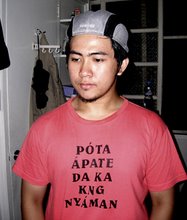And the Surprising Kapampangan Alternative Cinema AudienceLast 23rd of January, the Holy Angel University screened ‘Kaleldo’ (Summer Heat), one of the internationally award-winning films of Kapampangan alternative filmmaker Brillante Mendoza (2008’s Most Outstanding Kapampangan awardee for Mass Media) which like his other films exhibit a great deal of Kapampangan culture.

Even though I have already watched ‘Kaleldo’ in several cinemas and have viewed it over and over through my VCD player (yes, I bought an original VCD), I still made it a point to be there during the screening to observe how the students of Holy Angel University would find the film. Being bombarded with Hollywood- and Manila-produced movies in our local cinemas, it may be concluded that Kapampangans in general are still unaware of this thing advocated by Mendoza called alternative cinema, which does not rely on formulaic plots and glossy factors.
Mendoza the AdvocateAlternative cinema most of the time slaps social truths right in front of our faces. Even though we are immersed in these truths, we get so absorbed in them such that we are eventually inclined to ignore them. Instead of promoting escapism among the audience, it seeks to remind the viewers that the presentation of truth—regardless whether saddening or to be proud of—is another important function of films. This Mendoza realized when his debut film ‘Masahista’ was shown in Switzerland (where it eventually won the Golden Leopard Award in the video category). As he stated in hi speech before the screening, “I have come to realize how powerful a film can be.”
Right now, Mendoza is more than a filmmaker and a producer; he’s an advocate. He shows his films to various universities in Pampanga and shares the beauty of alternative cinema, hoping to spread the ideology to Kapampangan students for them to eventually widen their taste in movies—something which I believe my fellow kabalen are still lacking.

I am hoping as well that through the screening of Mendoza’s films in Pampanga, aspiring indie filmmakers, especially students, would learn to localize their content and be observant of their immediate surroundings, instead of trying to mimic what they see on television and pirated CDs. One clear sign of this is the preference of student filmmakers to use Tagalog as the medium of their films, even though all the characters seem to be Kapampangans. Goodness, I even know of one film which used 100% English as medium!
The film ‘Kaleldo’‘Kaleldo’—which in Kapampangan means summer, but the English title is ‘Summer Heat’—is the story of a family in Guagua ten years after the eruption of Mt. Pinatubo. The story focuses on the three sisters: Grace (Juliana Palermo), the youngest among the three who is freshly wed to a Mama’s boy type of guy; Lourdes (Angel Aquino), a career-oriented and aggressive woman who is having an affair with a bank manager; and Jess (Cherry Pie Picache), the butch-type lesbian maker of atchara, who is also the eldest among the sisters.
The film is divided into three chapters, depending on the character on focus: Angin (Wind) for Grace, Api (Fire) for Lourdes, and Danum (Water) for Jess. Each element artistically represents the personality of the character and the mood of the chapter.
Even though the film is, as Mendoza described, “audience-friendly” because of its dramatic treatment, ‘Kaleldo’ can still be classified as alternative because it is not the type that would entice an average moviegoer to buy a ticket to. The actors are not exactly stars that have blind fanatics patronizing them in any activity they pursue unlike Sharon Cuneta, Aga Muhlach, Richard Gutierrez, or John Lloyd Cruz. The topic of the movie is not really something that would tickle the average man’s senses unlike the usual love stories and sex comedies of Star Cinema, GMA Films, Regal, etc.
Strange Kapampangan AudienceStrange—this was the adjective that appeared in my mind after observing the general reaction of the audience to ‘Kaleldo.’ Was I too judgmental? Honestly, I thought the Kapampangan students, who are not very exposed to indie films, would get bored with ‘Kaleldo.’ Yes, their “mababong kaligayan” was still evident, in that they made big deals over what I consider insignificant things in films such as butt exposures, local bad words, sex scenes, and homosexuality, but they likewise enjoyed the other serious scenes as well.
Could it be because the film exposes Kapampangan culture and we could relate? Could it be that reality is charming after all, in that being reminded of it (reality is buried in our subconscious, thanks to the escapist effects of mainstream movies) sends us laughing while thinking “so true, so true,” unlike the slapstick and corny jokes of Tagalog comedies?
Actually, even our short film ‘Ing Bangkeru’ (The Boatman) was screened as a front act to ‘Kaleldo.’ It’s a 10-minute short film with an artsy and eerie treatment, and I was expecting it to bore the students. I was surprised that the students not only appreciated it—they enjoyed it, especially in the climactic sequence.
The version of ‘Kaleldo’ screened at the University Theater was, I believe, the director’s cut, as the sex scenes were shown in full, unlike when I first watched the movie at SM Pampanga. One problem with the Kapampangan audience is that they sometimes see sex as sex alone, along with its traditional effects to our pretending-to-be-conservative psyches—that sex is private and showing it in public, even through film, is either immoral, taboo, or humiliating.
The students, too overwhelmed with the graphic sex acts unfolding in front of them, failed to see the embedded messages in each sex scene. Upon closer look, Grace’s sex scene with her husband is an illustration of one of the gender-related problems which I first came to know in Albina Peczon Fernandez’ class in UP Diliman—the one-way sexual satisfaction between couples. In the movie, Grace and her husband have sex one night, but it was only the husband who was satisfied; he cummed quickly and ordered Grace to stop despite her not reaching orgasm yet. Lourdes’ sex scene on the other hand is for me an illustration of this phenomenon called marital rape, where the wife is forced to have sex with her husband even though she doesn’t feel like it; unfortunately, it’s hard for the woman to complain about it they’re married anyway. The sex scene of Jess, the lesbian, with her girlfriend (Criselda Volks) is more than a sex scene—it’s a genuine love scene, because she and her girlfriend performed intercourse because they loved each other. The only obstacle in their relationship was the conservatism of society, especially their father (Johnny Delgado), who still found girl-to-girl relationships strange.
In spite of the students not seeing these messages (probably because gender issues related to sex are not yet familiar to students), I believe only a few got “offended” with the explicit showing of bed scenes. The movie still went on and the majority still loved the film.
Could it be that alternative cinema has hope for the Kapampangans? We cannot conclude yet. Almost all the viewers present during the screening were students required by their respective professors to watch and to make reaction papers afterwards. Even though they enjoyed the film while watching it, I can’t help but to ask: if no student was forced to attend the screening, will films like ‘Kaleldo’ still entice a number of Kapampangan viewers to patronize? Like Mendoza, I doubt it. That is why an increase in awareness of alternative cinema and its beauty is needed in the province.
UpcomingIn the afternoon of January 31, HAU will be screening two more films by Brillante Mendoza—the Ayta-Kapampangan film ‘Manoro’ (The Aeta Teacher) and the equally cited ‘Foster Child’ starring Cherry Pie Picache. Tickets are sold at P50.
































